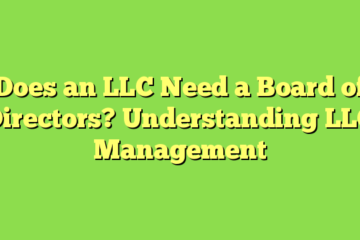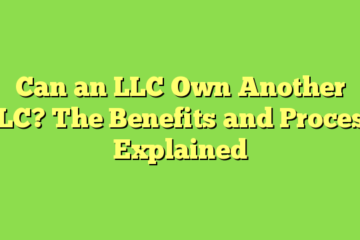As a real estate investor, expanding your portfolio across state lines can open up new opportunities and diversification benefits. But can you legally use your existing Limited Liability Company (LLC) to own properties in another state? To find out the answer, read this article till the end.
Whether you’re a seasoned investor or just starting to look into multi-state ventures, this article will provide the knowledge you need to make informed decisions and successfully manage your real estate investments across state boundaries.
Can an LLC in One State Own Property in Another?
The short answer is yes, an LLC formed in one state can legally own property in another state. However, there are several important considerations and steps that must be taken to ensure compliance with state laws and regulations.
Registering as a Foreign LLC
When an LLC wants to conduct business or own property in a state other than the one it was formed in, it must register as a “foreign LLC” in that state. This process typically involves the following steps:
Appoint a Registered Agent
You’ll need to appoint a registered agent in the state where the property is located. This agent will be responsible for receiving legal documents and correspondence on behalf of your LLC.
File the Application
Submit the required paperwork, such as the Articles of Organization and Operating Agreement, along with the necessary filing fees to the appropriate state agency.
Obtain Necessary Licenses and Permits
Depending on the state, you may need to obtain additional licenses or permits to legally operate your LLC and own property there.
Comply with State Requirements
Each state has specific requirements for foreign LLCs, such as filing annual reports, paying franchise taxes, and maintaining certain records.
Failure to register as a foreign LLC in the state where you own property can result in fines, penalties, or even the inability to legally own or operate the property.
Tax Considerations for Out-of-State Properties
Owning property in multiple states can introduce additional tax complexities for your LLC. Here are some key considerations:
State Income Taxes
Some states may require foreign LLCs to pay income taxes on the profits generated from properties within their borders, even if the LLC is not considered a resident entity. Understanding the income tax rules in each state where you own property is crucial.
Apportionment and Allocation of Income
If your LLC operates in multiple states, you may need to apportion or allocate your income among those states for tax purposes. This can involve complex calculations and rules that vary from state to state.
Property Taxes
Property tax rates can vary significantly between states and even between counties or municipalities within the same state. Factoring in these costs is essential when evaluating potential investment opportunities.
To navigate these tax complexities, it’s highly recommended to consult with a qualified tax professional who specializes in multi-state real estate investments and LLC taxation.
Asset Protection and Liability Considerations
One of the primary benefits of using an LLC for real estate investments is the asset protection it provides. However, there are some important considerations when owning out-of-state properties:
Separate LLCs for Each Property
To maximize asset protection, it’s advisable to establish a separate LLC for each investment property you own in different states. This way, if one property faces legal or financial issues, the other properties and assets held in different LLCs will not be affected.
Insurance and Liability Coverage
Ensure that your LLC has adequate insurance coverage for the properties it owns, including liability insurance. Additionally, review the coverage regularly and make adjustments as needed to account for any changes in state laws or property values.
Compliance with State Laws and Regulations
Each state has its own set of laws and regulations governing real estate ownership, landlord-tenant relationships, and property management. Familiarizing yourself with these laws and ensuring that your LLC is in full compliance is crucial to avoid potential legal issues or penalties.
Managing Out-of-State Properties
Owning and managing out-of-state properties can be challenging, especially when dealing with multiple states and their respective laws and regulations. Here are some tips for effectively managing your out-of-state properties with an LLC:
Hire Local Property Management
Consider hiring a reputable property management company in the state where your investment properties are located. These professionals can handle day-to-day operations, and tenant relations, and ensure compliance with local laws and regulations.
Establish Clear Communication Channels
Set up clear communication channels with your property managers, tenants, and any other parties involved in managing your out-of-state properties. Leverage technology, such as online portals or video conferencing, to stay up-to-date and address any issues promptly.
Maintain Detailed Records
Keep meticulous records of all transactions, communications, and activities related to your out-of-state properties. This will not only help you stay organized but can also be crucial in case of any legal disputes or tax audits.
Network with Local Professionals
Build a network of local professionals, such as attorneys, accountants, and real estate agents, who can provide valuable insights and guidance on navigating the specific legal and financial landscapes in the states where you own properties.
By following these best practices, you can effectively manage your out-of-state real estate investments while minimizing risks and maximizing returns.
Conclusion
While an LLC in one state can legally own property in another, it’s crucial to understand and comply with the specific legal and tax requirements of each state where you own property. Registering as a foreign LLC, navigating tax complexities, and implementing effective property management strategies are essential for successfully owning and operating out-of-state properties through an LLC.
By consulting with professionals, maintaining detailed records, and carefully navigating the legal and financial landscapes, you can unlock new investment opportunities and pave the way for long-term growth and success in your real estate ventures.

Alfie Wilson, Esq., is a legal content writer with expertise in business formation, criminal law, veterans disability, family law, DUI law, personal injury, animal welfare, and legal writing. He holds a J.D. from Emory University School of Law and has experience in appellate advocacy and regulatory matters. Alfie’s passion lies in breaking down complex legal topics for a non-lawyer audience. He currently writes for law firms and non-profits on various issues and resides in Arlington, Virginia.








